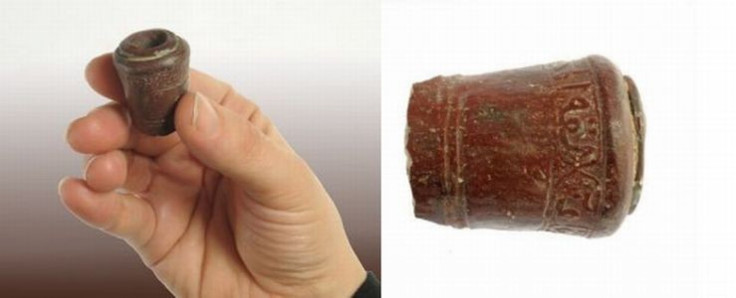Jerusalemites Gave Smoking Pipes as Gifts to Lovers during Ottoman Period

A romantic inscription found on the ceramic mouthpiece of a tobacco pipe discovered during an ongoing archaeological excavation in the Jewish Quarter of Jerusalem suggests the pipe was probably given as a gift to a lover.
The Arabic inscription reads: Heart is language for the lover, according to a statement released, on Sunday, by Dr. Kate Rafael of the Israel Antiquities Authority (IAA). Dr. Rafael is leading the excavation of the site. The literal translation of the caption, however, means: “Love is language for the lovers.
The pipe dates back to the Ottoman period, between the 16th and the 19th centuries, when clay pipes were very common and were mostly used for smoking tobacco.
Smoking was quite popular among both men and women in Jerusalem during the Ottoman rule. According to IAA archaeologists, Jerusalem’s drawings dating back to the 19th century portray Jerusalemite women smoking clay pipes similar to the one uncovered in the excavation.
The Ottoman authorities tried to combat smoking but failed when they realized the practice was ingrained at all levels of society. People used to smoke in cafes and in groups of friends. Archaeologists say modern day coffee shops in Jerusalem developed around that practice.
Coffee shops in Jerusalem are still known today for combining “the pleasures of both drinking coffee and smoking a hookah and pipe.”
In addition, clay pipes were used as an accessory or an ornamental piece worn over a garment. This further reinstates the popularity of pipes among Jerusalemites during the Ottoman period.
Archaeologists uncovered the clay pipe a fortnight ago. IAA’s Shahar Puni said the inscriptions on the items and monuments discovered from archaeological excavation sites have revealed much about society, culture and religion in general but the one on the pipe spoke more about the relationships between the sexes back then.
“We sometimes find inscriptions that are of a personal nature: verses of a poem, congratulations and other quotations from which we can learn about daily life and even emotional matters between a man and woman,” he said.
© Copyright IBTimes 2024. All rights reserved.











